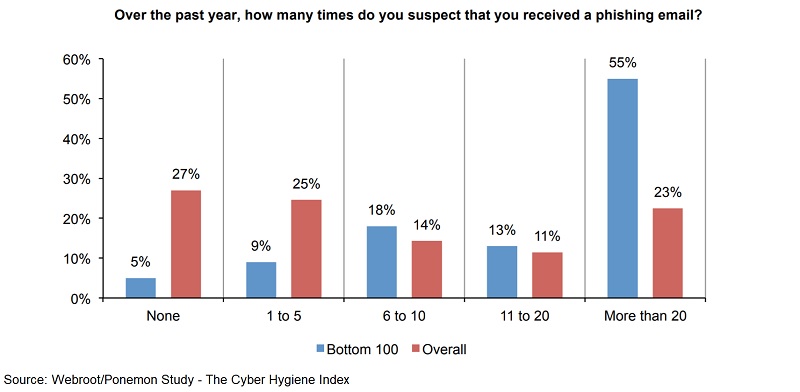Rate the State: Study Rates Personal Cyber Hygiene Habits by US State
September 21, 2018
The results are in. A recent study by Ponemon Institute shows the level of cyber hygiene in the U.S. by state. Ten states have emerged on both ends of the cybersecurity spectrum – five good and five not-so-good. The study measures the level of cyber-risk residents of these states practice as everyday users. A total of 4,290 residents across the 50 U.S. states plus DC were surveyed and the results are both promising and jaw-dropping, depending on where you live.
Regardless of what state you live in, a closer look at some of the questions asked by the study give insight into the obstacles affecting good cyber hygiene. Below is a look at a few results and how they differ.
Password Hygiene
Florida residents, 72% of them, report they share passwords and other credentials providing access to accounts – a big cyber security no-no. On the other hand, 53% of New Hampshire residents say they don’t share passwords and other access information.
Identity Theft Hygiene
Out of all respondents who experienced identity theft on both ends of the spectrum, only 5% of bottom respondents say they used more caution on the Internet after their data theft. 60% of bottom respondents say identity theft had no effect on their cyber hygiene practice. As for top-level respondents, 42% of identity theft victims beefed up their cyber hygiene after identity theft, while only 14% say it had no effect on their practices.

Anti-Virus Protection
Respondents answered the question of whether they use anti-virus software on their laptop, desktop or smartphone. Out of those of the bottom five, 24% say they do use anti-virus software on devices, while 76% say they don’t use it at all. From the overall respondents, 50% say they do use anti-virus, while 46% claim they don’t use it.
Of course you should never share your passwords with anyone; even those in the IT department…no matter how nicely they ask. And it’s better to have good cyber hygiene from the beginning and avoid becoming a victim in the first place. Installing anti-virus on all of your devices should be automatic at this point. Of course, it isn’t going to eliminate all risks, but it does catch a lot of the malware that attempts to get through. So, just install it, even on your Apple devices. These are becoming targeted more often because of the popularity of the items.
Although the report by Ponemon provides a snapshot of cyber hygiene by state, regardless of location, it’s a look into how Americans approach their own cyber security. The report raises more questions than it answers. Mainly, why the results of all states aren’t closer to 100% using good cyber hygiene. Residents of the U.S. know the risks associated with being online, yet individual cyber security practices don’t reflect that knowledge. Whether you live in New Hampshire, Florida, or any other state in the nation, smart cyber hygiene is an essential part of fighting cybercrime.
Stickley on Security
Published September 20, 2018

